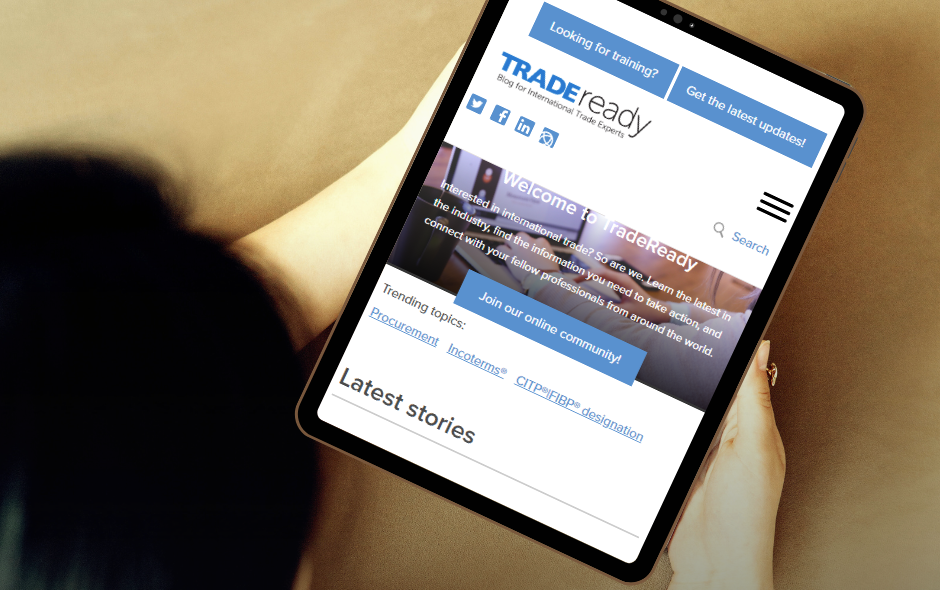
For a company to develop the most effective plan for marketing a product internationally, it must understand the needs, desires and income of its potential customers.
It must also have full knowledge of distribution systems, delivery times, pricing and the most effective methods of promotion in the intended market.
These factors will often be very different than a company is accustomed to in their domestic market. The good news is, the differences can be discerned through thorough international trade research.
In fact, the information provided by international trade research is needed at all stages of the marketing process.
Situation analysis
Companies can use the information provided by international trade research to develop a thorough understanding of a market and identify possible opportunities.
Marketing strategy
International trade research will provide information needed to position a product to a selected target market and will also help marketing teams identify the value propositions that are likely to be successful.
Marketing mix
International trade research will provide valuable information to guide product design for a target market and indicate the price range that it will be appropriate to demand.
Implementation and control
International trade research will enable companies to monitor the effects of a marketing strategy and identify changes in the market that will require marketing or product adjustments.
A great example of the successful implementation of the marketing processes above is Proctor and Gamble’s foray into the Japanese market with one of their products.
Proctor and Gamble use international trade research to adapt their product
Proctor and Gamble’s research into the Japanese marketplace identified a possible opportunity for disposable diapers. Customer research showed that Japanese mothers tended to change diapers more often than mothers in the U.S. and other Western countries.
Based on this information, Proctor and Gamble prepared a marketing and strategic plan to sell disposable diapers to the Japanese market. The company calculated that they could export diapers to the market at a competitive price.
Market research indicated that quality was an important purchasing factor, so the exported diapers were high quality, while being reasonably priced compared to competing brands.
Despite these measures, sales of the diapers were sluggish. To find out why, the company carried out more intensive market research. This research identified that one purchasing factor was the limited storage space in Japanese homes as compared to homes in North America.
This insight enabled the company to adapt their product to meet the customers’ needs. They designed a more compact version of a disposable diaper and renewed their promotional strategy. Sales rose sharply.
As well as identifying opportunities, international trade research might indicate that a planned course of action is not wise.
Research might indicate that an international marketplace is saturated with the type of product a company plans to offer. This can prompt the company to adjust the product or service offering or target another location.
Research can also identify warning signs of financial and political instability that might result in future losses because of regime change, currency devaluation or even war.
Pinpoint potential problems ahead of time
Even when a market seems like an attractive possibility for international trade, companies must consider the many challenges and potential problems involved. Many of these might be unknown until international trade research is conducted.
For example, many countries impose tariffs, a form of tax, on imports from countries with which they do not have specific trade agreements. Such tariffs are much higher for manufactured products than they are for commodities. These charges will obviously add to the costs for the importer.
Companies might also decide to export goods without realizing that there are strict legislative or product safety guidelines, required inspections or approval processes for shipping goods in the importing country.
Without proper research, companies might find themselves overpaying duties, paying fines for overlooking compliance issues or encountering costs caused by shipping delays.
There are numerous examples of mistakes resulting from companies developing strategic plans without devoting the time to carrying out proper research into the legalities, customs, cultures or infrastructure of a new international market.
Even the most obvious information can be overlooked, causing embarrassing mistakes
In 2004, a child-labour activist from Hyderabad, India, filed a public-interest action against PepsiCo India for glorifying child labour in a television advertisement. The advertisement showed the Indian cricket team celebrating a winning game while being served Pepsi by a young boy.
This case was embarrassing for PepsiCo and might have been avoided if researchers working on the promotional strategy had identified how Indian consumers were likely to react to this idea.
Microsoft also blundered in the Indian market. When colouring in a map of India for its Windows operating system, the software giant used a different shade of green for the eight pixels representing the disputed Kashmiri territory.
The colour difference meant Kashmir was shown as non-Indian on the map. This led to the software being banned in India almost immediately after release. Microsoft had to recall all 200,000 copies and lost millions of dollars.
The result of not performing international trade research properly can range from poor sales and lost profits to damage to a company’s reputation, legal action, fines and imprisonment.
Companies that conduct diligent research, and are agile enough to adapt their products to meet the needs of their new target market have a much better chance for success.
Have you used insights gained through extensive market research to adapt a product or service that was lagging in a new market? Is there anything truly surprising that you discovered through international trade research?







disqus comments